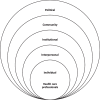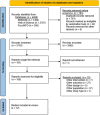Healthcare professionals' perspectives on artificial intelligence in patient care: a systematic review of hindering and facilitating factors on different levels
- PMID: 40312413
- PMCID: PMC12046968
- DOI: 10.1186/s12913-025-12664-2
Healthcare professionals' perspectives on artificial intelligence in patient care: a systematic review of hindering and facilitating factors on different levels
Abstract
Background: Artificial intelligence (AI) applications present opportunities to enhance the diagnosis, prognosis, and treatment of various diseases. To successfully integrate and utilize AI in healthcare, it is crucial to understand the perspectives of healthcare professionals and to address challenges they associate with AI adoption at an early stage. Therefore, the aim of this review is to provide a comprehensive overview of empirical studies that explore healthcare professionals' perspectives on AI in healthcare.
Methods: The review was conducted according to the Preferred Reporting Items for Systematic Reviews and Meta-Analyses framework. The databases MEDLINE, PsycINFO, and Web of Science were searched in the timeline of 2017 to 2024 using terms related to 'healthcare professionals', 'artificial intelligence', and 'perspectives'. Eligible were peer-reviewed articles that employed quantitative, qualitative, or mixed-methods approaches. Extracted facilitating and hindering factors were analysed according to the dimensions of the socio-ecological model.
Results: Our search yielded 4,499 articles published up to February 2024. After title abstract screening, 150 full-texts were assessed for eligibility, and 72 studies were ultimately included in our synthesis. The extracted perspectives on AI were thematically analyzed using the socioecological model in order to identify various levels of influence and to categorize them into facilitating and hindering factors. In total, we identified 49 facilitating and 43 hindering factors across all levels of the socioecological model. CONCLUSIONS: The findings from this review can serve as a foundation for developing guidelines for AI implementation adressing various stakeholders, from healthcare professionals to policymakers. Future research should focus on the empirical adoption of AI applications and, if possible, further examine the hindering factors associated with different types of AI.
Keywords: Artificial intelligence; Barriers; Facilitators; Healthcare professionals; Perspectives.
© 2025. The Author(s).
Conflict of interest statement
Declarations. Ethics approval and consent to participate: Not applicable. Consent for publication: Not applicable. Competing interests: The authors declare no competing interests.
Figures




References
-
- Schwartz WB. Medicine and the computer: the promise and problems of change. In: Blum BI, Anderson JG, Jay SJ, editors. Use and Impact of Computers in Clinical Medicine. New York: Springer, New York; 1987. p. 321–35. 10.1007/978-1-4613-8674-2_20.
-
- WHO. Ethics and governance of artificial intelligence for health; 2021.
Publication types
MeSH terms
Grants and funding
LinkOut - more resources
Full Text Sources

